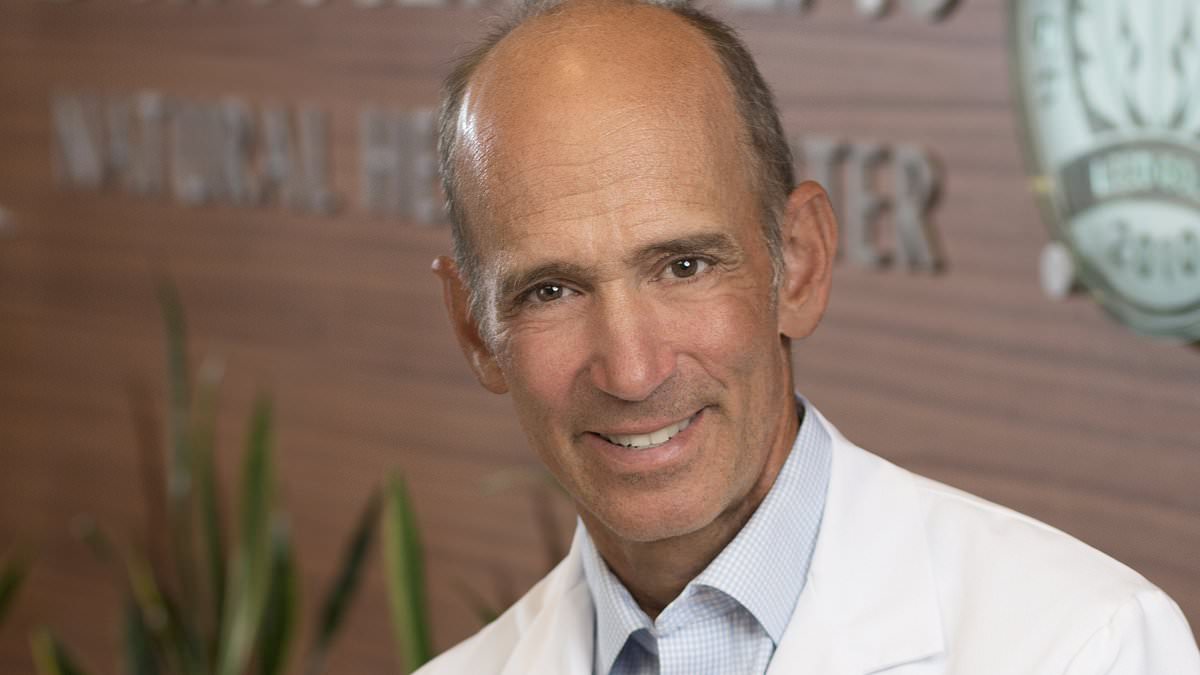You almost certainly have one, if not more, of them in your home.
But a doctor is urging people to throw out essential items in their kitchen due to their growing links to cancer.
Increasingly, research shows microplastics – microscopic compounds that are shed by larger plastic items – get into our blood, accumulate in our organs and cause untold damage.
They leach into the food we eat, the water we drink and air we breathe and have been linked to heart disease, dementia and several cancers.
Dr Joseph Mercola, a family medicine osteopathic physician and author of Your Guide to Cellular Health, told DailyMail.com that many of the products responsible for this cascade of health issues can be found in your kitchen.
He said: ‘Many common kitchen items that you use every day either contain or release microplastics during food preparation and consumption.’
Dr Mercola pointed to the obvious one first: non-stick cookware and plastic utensils. They’re a risk because of their close contact with the food we eat, plus the constant exposure to heat speeds up their degradation.
Black plastic utensils in particular have been shown to contain the highest levels of toxic chemicals.
But Dr Mercola points to other essentials like plastic cutting boards, Tupperware, coffee and tea pods and salt and pepper grinders.

Dr Joseph Mercola (pictured here), a family medicine osteopathic physician and author of Your Guide to Cellular Health, told DailyMail.com he avoids non-stick pans, coffee pods, and spice grinders to cut down on harmful microplastic exposure

Microplastics are miniscule pieces of plastic that seep into food, water, and the air from products like non-stick pans, clothes, and children’s toys
He advises swapping to a wooden chop board to keep hormone-disrupting microplastics from seeping into meat and vegetables.
And he recommends people opt for loose grounds and spices to cut down on unnecessary plastic from grinders and coffee machines.
Dr Mercola said: 'Microplastics represent a significant long-term danger to your health because they contain endocrine disrupting chemicals (EDCs).
'These chemicals mimic estrogen and have been linked to infertility and hormone-driven cancers.
'Research suggests that, once you ingest or inhale microplastics, they can accumulate in your tissues producing chronic inflammation and an elevated risk of heart attacks and strokes.'
Increased prevalence of EDCs has been blamed as a potential cause of America's fertility crisis.
Read More
Study uncovers fast food items with microplastics linked to cancer and autism

This has largely been seen with phthalates, which are added to plastics like food storage containers to make them pliable and soft.
One study in the journal Toxicological Sciences, for example, found that female mice exposed in the womb to the same phthalate mixtures detected in pregnant women were born with fertility issues, which they then passed on to their female offspring.
Additional research has found that higher levels of phthalates in women's urine could reduce their likelihood of getting pregnant and increase their risk of pregnancy loss before 20 weeks gestation.
A study in the journal Breast Cancer Research also found that higher urinary levels of phthalates were associated with an up to 32 percent increased risk of breast hormone receptor-positive breast cancer.
Meanwhile, a Polish study showed that phthalate exposure in men lowered their sperm quality and sperm count, decreasing the chance of conceiving.
To cut down on phthalate exposure, Dr Mercola suggests switching to storage containers made from glass, which are non-porous, preventing chemicals from leaching into foods.
Dr Mercola also pointed to non-stick pots and pans, which are often coated with Teflon.

Microplastics used to coat non-stick cookware have been shown to increase the risk of some cancers and thyroid diseases

Some coffee pods, Dr Mercola warned, are made with polypropylene #5, which have been linked to reports of asthma
Also known as polytetrafluoroethylene (PTFE), Teflon is used to repel water and oil and keep food from sticking to the surface.
While Teflon is not considered a carcinogen, some studies have raised concerns about perfluorooctanoic acid (PFOA), a chemical previously used to produce Teflon.
PFOA is considered a per- and polyfluoroalkyl substance (PFAS), also dubbed 'forever chemical,' meaning it doesn't break down in the environment.
PFAS have been associated with increased risks of cancer, thyroid disease, and high cholesterol.
Dr Mercola said: 'You could replace nonstick cookware with ceramic or stainless-steel pots and pans.'
He also noted toxic chemicals can even make their way into your morning cup of tea or coffee.
Keurig K-Cups, for example, are made from polypropylene #5, a synthetic polymer derived from the fossil fuel petroleum.
While polypropylene #5 is considered one of the safest microplastics, some research has suggested excess exposure could infiltrate the lungs and lead to asthma.
Dr Mercola said these plastics have also been found in some tea bags.
One 2024 study in the journal Chemosphere found brewing tea with a bag made from polypropylene #5 released 1.2billion pieces of plastic per milliter of tea.
If you need a caffeine boost in the morning, Dr Mercola suggested using loose coffee grounds or loose leaf tea rather than opting for pods or tea bags.
Spices with built-in grinders are also on Dr Mercola's chopping block.
He said: 'Spice grinders made of polymers like POM (polyoxymethylene), PS (polystyrene), and PMMA (polymethyl methacrylate) have been shown to deposit microplastic particles into the ground spices, with POM-based grinders resulting in the highest contamination levels.'
When heated to high temperatures, POM has been linked to respiratory issues.
Dr Mercola suggests buying spices stored in glass containers that don't have built-in plastic grinders.
